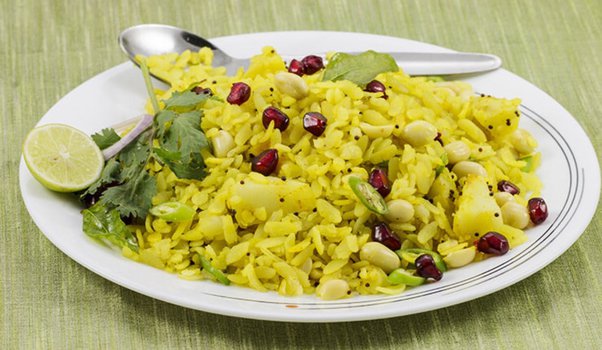In this comprehensive guide, we delve into a common question: Does poha cause constipation? We will explore what poha is, its dietary properties, how it can affect digestive health, and its role in managing constipation. This discussion aims to provide clear insights and help individuals make informed dietary choices.
Understanding Poha
Poha, also known as flattened rice, is a popular Indian breakfast dish made from dehusked rice which is flattened into light, dry flakes. These flakes of rice swell when added to liquid, whether hot or cold, making them easy to cook. Because of its versatility, poha is a staple in many households, especially in the Indian subcontinent.
Nutritional Profile of Poha
Here's a detailed breakdown of the nutritional profile mentioned and why it's considered beneficial for health:

Digestibility and Low-Calorie Content:
Poha is processed by parboiling paddy rice and then flattening it, which partially cooks the rice. This process enhances its digestibility, making it a preferred breakfast or snack option that is light on the stomach.
Being low in calories, poha is an excellent food choice for those aiming to lose weight or manage their calorie intake effectively without feeling heavily satiated.
Complex Carbohydrates:
The primary nutrient in poha is complex carbohydrates, which are released slowly into the bloodstream. This leads to a more consistent energy supply and avoids the sharp spikes in blood sugar levels that simple carbohydrates cause. It's an excellent source of sustained energy, particularly suitable for breakfast.
Moderate Amounts of Protein:
Poha contains a moderate amount of protein, which is crucial for building and repairing tissues, making it a healthier option compared to refined carbohydrate snacks. While it's not a high-protein food, it can contribute to the protein requirements of the diet, especially when paired with other protein-rich foods.
Iron:
Iron is a vital component of hemoglobin, a protein in red blood cells that carries oxygen to the body's tissues. Poha is fortified with iron in many cases, making it a good way to boost daily iron intake, which is essential for preventing anaemia and supporting metabolic processes.
Dietary Fiber:
Poha contains dietary fibre, which helps in digestion and prevents constipation. Fiber aids in maintaining a healthy digestive system promotes a feeling of fullness and can assist in weight management by reducing overeating.
Low in Fat and Gluten-Free:
Being low in fat, poha is an appealing option for those looking to maintain or reduce their fat intake for health reasons.
Additionally, poha is naturally gluten-free, making it a safe and popular choice for individuals with gluten intolerance or celiac disease.
Does Poha Cause Constipation?
To answer the question: does poha cause constipation? We need to look closely at its fiber content. Fibre plays a crucial role in digestion; it helps form bulk in the intestines, which stimulates the bowels to move waste through the digestive tract. Poha, however, contains only a moderate amount of fibre. This means that while it isn’t particularly constipating, it’s also not a high-fiber food that can significantly aid those with constipation.
Digestive Benefits of Poha
Easy to Digest:
Poha undergoes a pre-cooking process during its production, where rice is parboiled before being flattened. This pre-cooking helps break down the starches, which means that poha is partially cooked even before you prepare it at home. This makes poha easier to digest compared to raw rice or other grains that might require longer cooking times and more robust digestion.
The soft and light texture of poha also makes it gentle on the stomach, which is ideal for people who have sensitive digestion or are recovering from a stomach upset.
Low Fiber Content:
Although poha is not very high in dietary fibre, the small amount it contains is sufficient to aid in regular digestion without irritating. High fibre foods, while beneficial, can sometimes be harsh on a sensitive digestive system or exacerbate symptoms in people with conditions such as Irritable Bowel Syndrome (IBS). Poha provides a good alternative as it offers some fibre but not in excessive amounts.
Suitability for Soft Diets:
For individuals who require soft diets, especially after medical procedures, during illness, or for those with chronic digestive issues that require gentle foods, poha is an excellent choice. It’s soft and easy to chew and swallow, reducing the strain on the digestive tract.
Part of a Balanced Diet:
For most people with normal digestive functions, incorporating poha into the diet can be beneficial without the risk of constipation or digestive discomfort. When balanced with other fibre-rich foods throughout the day, poha can contribute to a well-rounded diet.
Poha can also be enhanced nutritionally by adding vegetables, legumes, or nuts, which not only increase its fibre content but also add vitamins, minerals, and protein, making it a more complete meal.

Enhancing Poha to Avoid Constipation
Fresh Vegetables (Peas, Carrots, Onions):
Adding vegetables like peas, carrots, and onions to poha increases its dietary fibre, vitamins, and mineral content. These vegetables enhance the bulk and texture of the meal, which helps in promoting better bowel movements and preventing constipation.
Vegetables are also rich in antioxidants and provide essential nutrients such as vitamin A, vitamin C, and potassium, which contribute to overall health.
Seeds (Flaxseeds, Chia Seeds):
Seeds like flax seeds and chia seeds are excellent sources of fibre. They also contain omega-3 fatty acids, which are beneficial for heart health. When added to poha, they help in creating a more filling meal that aids digestion and ensures smooth bowel movements.
These seeds absorb water and expand in the stomach, which helps to keep you full longer and can aid in cleansing the digestive tract.
Nuts (Almonds, Walnuts):
Nuts such as almonds and walnuts add both fibre and protein to poha, making it more satiating. They are also packed with healthy fats, which are essential for maintaining good health.
Including nuts can improve the texture and taste of poha, making it not only healthier but also more enjoyable to eat.
Fresh Fruits (Berries, Sliced Banana):
Incorporating fruits like berries and bananas increases the fibre and natural sugar content of the meal, providing a quick source of energy and aiding in digestion.
Fruits add natural sweetness and flavour, enhancing the overall appeal of the dish. Berries, in particular, are high in antioxidants, while bananas provide potassium, which is crucial for muscle function and overall cellular health.
Tips to Prevent Constipation
Increase Fiber Intake:
Vegetables and Fruits: Incorporate a variety of vegetables and fruits into your meals. Aim for at least five servings per day. Include both soluble and insoluble fibres, which help with digestion and stool formation respectively. Examples include leafy greens, apples, berries, and root vegetables.
Whole Grains: Replace refined grains like white rice and white bread with whole grains such as oats, brown rice, barley, and whole wheat products. Whole grains contain more fibre, which helps to bulk up the stool and makes it easier to pass.
Legumes: Beans, lentils, and chickpeas are excellent sources of fibre. They can be added to salads, soups, and stews, providing both nutrients and a fibre boost.
Stay Hydrated:
Drinking plenty of water is crucial in the prevention of constipation. Water helps to soften the stool, making it easier to pass. The general recommendation is to drink about 8-10 glasses of water a day, but this can vary based on individual needs and activity levels.
Other fluids like herbal teas can also contribute to your daily hydration. However, it's best to limit beverages that can dehydrate, such as those with caffeine and alcohol.
Exercise Regularly:
Regular physical activity helps to stimulate the natural contraction of intestinal muscles, aiding the movement of food through the digestive system.
Aim for at least 150 minutes of moderate aerobic activity, such as walking, cycling, or swimming, per week. Even daily gentle activities like stretching or yoga can help maintain regular bowel movements.
Mindful Eating:
Take time to chew your food thoroughly. This not only makes digestion easier but also slows down your eating pace, which can improve the digestive process and signal to your body when you’re full.
Avoid eating while distracted (e.g., watching TV or using electronic devices). Being mindful while eating helps in recognizing the body's hunger and fullness signals more accurately, preventing overeating, which can contribute to constipation.
Common Myths and Misconceptions
Myth: Poha is Instantly Digestible and Causes No Digestive Issues
Fact: While poha is easier to digest due to its processing (pre-cooking and flattening), it does not mean it is "instantly" digestible or that it cannot cause any digestive issues. Its impact on digestion can vary depending on individual digestive health and what it is paired with during meals. For most people, poha is gentle on the stomach, but for others, especially those with specific gastrointestinal conditions, any food, including poha, might cause discomfort if consumed in improper quantities or without balance.
Myth: Poha is High in Calories and Can Cause Weight Gain
Fact: Poha is low in calories. A typical serving (about 100 grams of uncooked poha) contains approximately 360 calories, but it also swells up considerably after cooking, serving more volume with fewer calories. It's a misconception that poha is fattening; it depends on how it is cooked and what ingredients are added to it (like fried peanuts, potatoes, or extra oil). When prepared with minimal oil and healthy additions like vegetables, it can be a part of a weight loss diet.
Myth: Poha Can Completely Replace Vegetables in Terms of Nutritional Value
Fact: Although poha can be enriched with iron and is a source of carbohydrates, it does not contain the vitamins, minerals, and fibre found in vegetables. It's important to consume a varied diet that includes vegetables, fruits, proteins, and grains to ensure all nutritional needs are met. Poha should be seen as part of a meal, not a complete meal itself unless it is supplemented with other food groups.
Myth: Poha Contains Gluten
Fact: Poha is gluten-free as it is made from rice, which does not contain gluten. This makes it a safe option for those with gluten intolerance or celiac disease. The confusion might arise because some people assume all grains contain gluten, which is not the case.
Myth: Poha is Suitable for Everyone's Digestion
Fact: While poha is generally easy to digest, everyone's digestive system is unique, and what works well for one person might not suit another. For instance, individuals with irritable bowel syndrome (IBS) or those who are easily bloated may find that certain ways of preparing poha (especially when seasoned heavily or fried) might trigger symptoms.
Conclusion
In conclusion, does poha cause constipation? Not necessarily, but it doesn’t prevent it either, especially if consumed in a diet low in fibre. To make the most of your meals and maintain good digestive health, consider enriching your poha with high-fibre foods and following general health tips to prevent constipation.
Remember, each body is different, and it’s important to observe how your own body responds to various foods. If constipation is a frequent issue, consulting with a healthcare provider is recommended.





